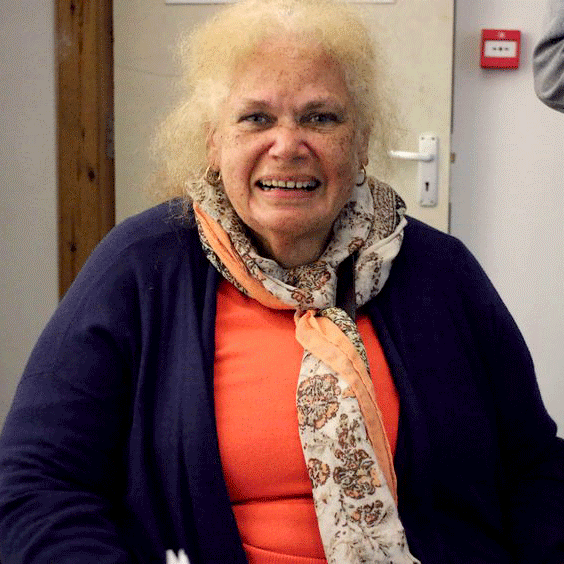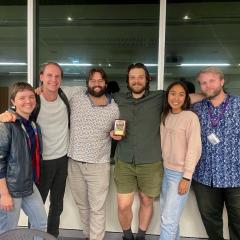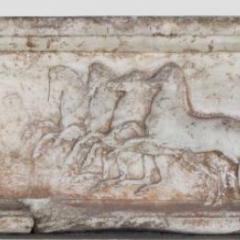Please click here for PowerPoint slideshow
2019 marks the 10th anniversary of World Philosophy Day (WPD) at The University of Queensland; celebrated on every 3rd Thursday of November since 2009, it is the longest running celebration of this important day in an Australian university.
On 21 November we celebrated philosophy’s diversity and potential for exploring interdisciplinarity with an all-day event to begin the Peace and Stability Dialogue Series. The event, a morning symposium with 180 attendees and afternoon small group dialogues with 35 participants, focused on establishing an ongoing series of discussions about how different disciplines approach the social and political ordering of human societies. A collaboration between the School of Historical and Philosophical Inquiry (HPI), School of Political Science and International Studies (POLSIS), and the Australian Earth Laws Alliance (AELA), six speakers were invited to present at the symposium with each speaker exploring a certain provocation:
 On Relationism and Survivalism: Mary Graham, a Kombumerri person (Gold Coast) through her father’s heritage.
On Relationism and Survivalism: Mary Graham, a Kombumerri person (Gold Coast) through her father’s heritage.- On Respect, Autonomy and Place: Yi Chen, Assistant Professor of Confucian Philosophy at Bond University.
- On Law, Economics and the Environment: Michelle Maloney, Co-Founder and Director of the Australian Earth Laws Alliance and Adjunct Senior Fellow at the Law Futures Centre, Griffith University.
- On Media, Technology and Communications: Marcus Foth, Professor of Urban Informatics in the QUT Design Lab, Creative Industries Faculty at QUT.
- On Melancholy Politics: Michelle Boulous Walker, Head of the European Philosophy Research Group and Associate Professor in Philosophy at UQ.
- On Pluralism, Ecology and the Commons: Martin Weber, Senior Lecturer in International relations at UQ.
The Peace and Stability Dialogue Series is a timely, innovative project initiated by Mary Graham, which, she hopes, will offer an ongoing opportunity for exploring knowledge systems, governance, knowledge of country, and the future of our relationship with land in Australia.
Mary has participated in previous World Philosophy Day events. In 2016, Simone Thornton invited her to be one of the guests along with Australian ecofeminist Freya Mathews and feminist activist Merle Thornton, who helped to establish the first Women's Studies course in Queensland at UQ in 1973. She and Merle were interviewed by Michelle Boulous Walker. In the following year Simone invited Mary back for a panel discussion with Karin Murris (School of Education, University of Cape Town) and Marguerite La Caze.
Aside from her publications with Morgan Brigg and others in POLSIS, and her involvement with AELA, among other things, Mary has also collaborated with Gil Burgh and Simone Thornton on a number of initiatives, including a Student-Staff Partnership project to integrate Indigenous knowledge into PHIL2210: Environmental Philosophy and a joint journal article published in the Australian Journal of Environmental Education, as well as presented guest lectures.
 Undeniably, this year’s World Philosophy Day was the result of Mary’s commitment to interdisciplinarity, dialogue between Indigenous and non-Indigenous people, and various collaborations over the years. This resonates with UQ’s Reconciliation Action Plan (RAP) to “aspire to make Aboriginal and Torres Strait Islander knowledges an integral component of [UQ’s] mission”, which is “to create change that positively influences society by engaging in the pursuit of excellence through the creation, preservation, transfer and application of knowledge”.
Undeniably, this year’s World Philosophy Day was the result of Mary’s commitment to interdisciplinarity, dialogue between Indigenous and non-Indigenous people, and various collaborations over the years. This resonates with UQ’s Reconciliation Action Plan (RAP) to “aspire to make Aboriginal and Torres Strait Islander knowledges an integral component of [UQ’s] mission”, which is “to create change that positively influences society by engaging in the pursuit of excellence through the creation, preservation, transfer and application of knowledge”.
The organisation of World Philosophy Day has also brought many unexpected opportunities. Already discussions on further collaborations with HPI staff are underway. Mary has agreed to be part of a special philosophy event; a conversation with ecofeminist writer and activist, Ariel Salleh, organised by Michelle Boulous Walker for the European Philosophy Research Group (EPRG), planned for March 2020 at UQ. Also, Michelle, Simone and Gil are organising a panel discussion on Mary Graham’s ideas for the 4th Australasian Political Theory & Philosophy Conference at La Trobe University in Feb 2020, which includes a keynote panel on “Indigenous Knowledge as a source for theory” with Mary, Morgan Brigg and Irene Watson. Watch this space next year for more details.
But back to World Philosophy Day! Established by UNESCO in 2005, World Philosophy Day promotes the importance of philosophy as a discipline, especially the teaching of philosophy as a dialogic learning process, which, for Gil Burgh, is an opportunity to encourage active and informed citizenship in a world of social media entanglement with politics, fake news, undemocratic governance, and media-driven opinion in the context of ‘post-truth’ social media and market-driven political campaigns. Gil thinks this was captured in this year’s 10th anniversary of celebrations, which had an array of philosophical traditions present, including European, feminist, Confucian, and Aboriginal philosophies, in dialogue with other disciplines including law, political theory, and media and communications.



